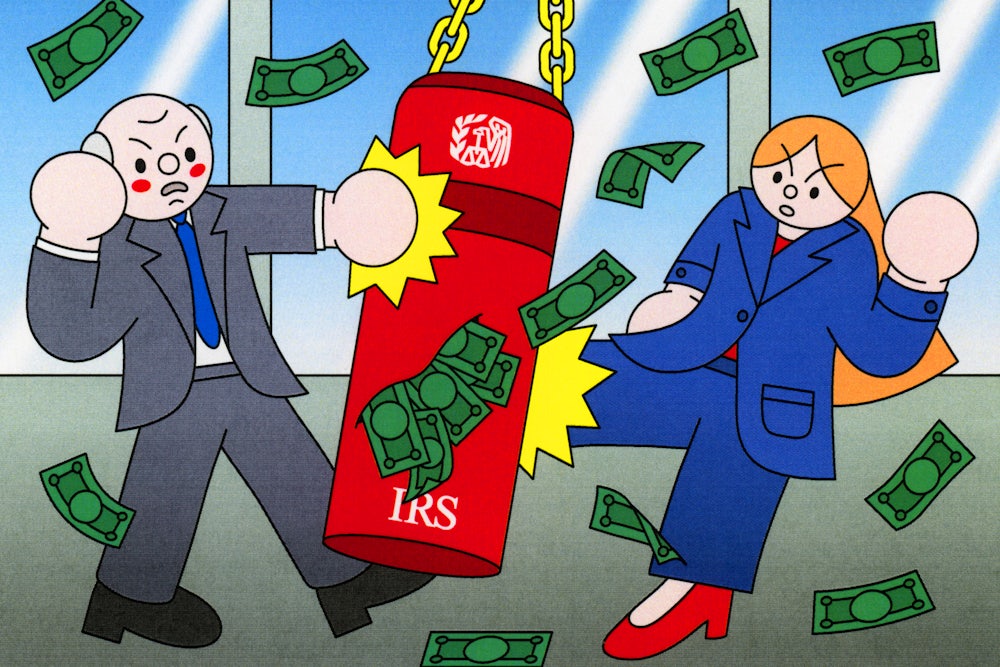On June 10, 2019, John Lewis took to the floor of the House of Representatives to tout a piece of legislation that he and his colleagues, including some Republicans, had worked on for years. It was to be a major legislative achievement, and he wanted the public to know it. “This is not a Republican or a Democratic bill,” Lewis said. “It is an American one,” a vital effort to reinvigorate a failing government agency.
At the time, the Internal Revenue Service was underfunded, understaffed, and unable to fulfill some of its most basic duties. Republicans in Congress had villainized it as a thieving bureaucracy for decades. Between 2010 and 2018, they had slashed its budget by 20 percent—and the IRS, whittled to a nub, was forced to lay off 22 percent of its staff. The agency was auditing about half as many individual income tax returns as it had at the start of the decade; audits of corporate returns had fallen by 37 percent, according to a report from the Congressional Budget Office. With the Taxpayer First Act, Lewis and his colleagues had hoped to refurbish the moribund organization and bring it into the modern era. But despite—or perhaps because of—its bipartisan support, the law didn’t include the one thing the IRS needed most: an increase in its budget. In the interests of efficiency, Congress was asking the IRS to do more with less. And no one seemed to have the political will to fix it.
Two years later, President Joe Biden appears intent on proving otherwise. In his proposed 2022 budget, he asked Congress to increase the IRS’s budget by more than 10 percent, and requested an additional $417 million for tax enforcement. Even more boldly, as part of his American Families Plan, Biden would grant the IRS $80 billion over 10 years to tackle tax evasion by the ultrarich in the hopes of raising $700 billion in revenue. He has also proposed increasing the top marginal income tax rate from 37 percent to 39.6 percent, as well as a modest increase in capital gains taxes for those earning more than $1 million. Biden needs every penny he can get to pay for his ambitious social programs. But is he really going to be able to revive the IRS, or will Republican intransigence cause him to sacrifice even modest reformist hopes for one of America’s most important bureaucracies?
The story of how the IRS arrived at its beleaguered and demonized state is not easily reducible to any one animating event. There have been tax protests for longer than there’s been a United States, but for most of the twentieth century, the federal government levied robust taxes, with the highest individual income tax rate topping out around 90 percent in the early Cold War years. It was only after the oil shocks of the 1970s and the rise of Ronald Reagan that tax cuts hardened into Republican dogma, and conservatives began to see taxes as inherently unjust, with Grover Norquist convincing more than 1,000 Republican lawmakers to sign the Taxpayer Protection Pledge, a promise to oppose all tax increases.
In the years since, Republican legislators have tried to chisel away at IRS resources, casting the agency as inefficient and tyrannical. They have performed a complicated dance of complaining about deficits while cutting taxes—claiming that the cuts would stimulate the economy and boost tax revenue. Democrats, succumbing to the same neoliberal logic, began treating all tax increases as a quick ticket to electoral disaster, and bought into Republicans’ core conceit even as deficits grew. In 2012, for instance, Obama supported an extension of some of Bush’s tax cuts.
Around that time, taxpayer dissent went into overdrive. Casting about for examples of government overreach, the Tea Party found its ultimate villain in Lois Lerner, an IRS official whom it accused in 2013 of systematically denying Tea Party groups nonprofit status. Lerner was never charged with a crime, but she lost her job and her reputation. After Republicans hauled her before the House Committee on Oversight and Government Reform to answer for her offenses, Congress found her in contempt, and she became a dark symbol of a supposedly politicized IRS. (In a strange foreshadowing of future email scandals, there was even a matter of some 30,000 misplaced email messages, which were later found.)
Biden won’t be able to turn back years of conservative attacks on the IRS overnight. Writing in The Des Moines Register in May, Senator Chuck Grassley mimicked the same tired Tea Party line that Republicans perfected during the Lois Lerner scandal: that Democrats had “weaponized” the IRS under Obama to “target conservative political organizations.” The agency, he said, wasted money on conferences, employee bonuses, and useless software. Even if Biden succeeded in giving it more money, he continued, the idea that it would be able to collect $700 billion in tax revenue was a “pipe dream.”
Some conservative Democrats have embraced this line of thinking. Bob Menendez of New Jersey and Joe Manchin of West Virginia have both expressed reservations about raising taxes on the rich. But Manchin at least has told The Wall Street Journal that the fact that the IRS is sitting on up to a trillion dollars in uncollected taxes “intrigues” him. Without additional funding, though, the agency may never track that money down.
If all else fails, Biden may be able to flip the script on Republicans. There has never been much proof of political influence at the IRS. (“They’re really not interested in your politics,” said Steven Toscher, a former IRS agent who now teaches at the University of Southern California. “It’s your pocketbook” they care about.) But the agency is systemically biased in another direction: It disproportionately audits the poor, because it’s cheaper and easier than targeting the wealthy. But even at the IRS, it takes money to make money, and it’s the superrich who are hiding untold billions offshore—billions that could fund childcare initiatives, roads, bridges, and schools. Biden isn’t going to go after an IRS bureaucrat like Lois Lerner, but he would likely find public support to remake an institution that’s rigged against everyday Americans—if he can give it the mandate and the resources to do its job.
Today’s Republicans and neoliberal Democrats preach the virtues of applying business thinking to governance—which means they, perhaps more than anyone, should be able to see that the IRS is a spectacularly good deal. Even in its diminished state, the IRS managed to collect $3.5 trillion in federal taxes in 2019 on a budget of just $11.8 billion. If the IRS has a dim public image, it owes it mostly to its congressional overseers who have hobbled it at every turn. But peel back the layers of rhetoric and one finds an essential federal agency that, with proper support, could be even better.




